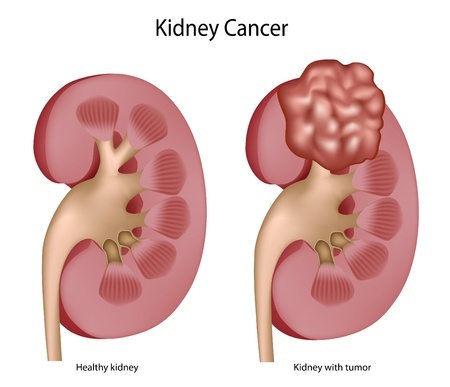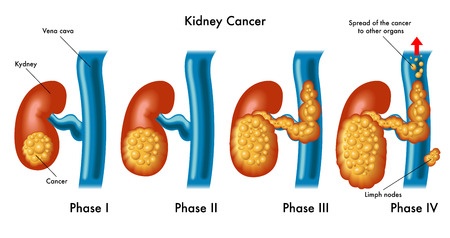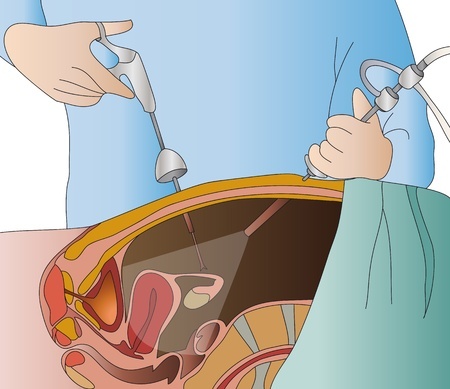Overview
The term “kidney cancer” refers to a family of malignancies that start in the kidney. More than 200,000 people around the world are diagnosed with kidney cancer every year.There are several types of kidney cancers but in the adults the renal cell carcinoma represents the majority of cases accounting for over 80% of all diagnosed kidney cancers. Kidney cancer is curable if found at early stages. The late stage disease, however, is deadly due to the “distant” disease or metastases spreading to the lungs, bones, second kidney or liver. For example, if tumor detected at early stage and is lesser than 4 cm in size, the survival rate of patients is around 90-95%. With the growth of tumour mass in size, the expected survival rate decreases to 80-85%. If cancer expands through the kidney capsule at the time of the diagnosis, only 60% of patients may be alive in 5 years. At the latest stage when tumour metastasizes, the 5-year survival is as low as 5%.

Symptoms
Kidney cancer at early stages usually does not cause any abnormalities. Signs of disease appear at later stages and may include blood in your urine, constant lower back pain, weight loss, fatigue and unexplained periods of fever.
Risk factors
The odds to develop a cancer of kidney increase with age, especially if you smoke, are obese, have high blood pressure and kidney failure. Some genetic factors also may play a role. For instance, Von Hippel-Lindau disease and some genetic mutations can cause hereditary papillary renal cell carcinoma. Some hereditary genetic alterations are also behind the kidney cancer in children (Wilms tumours).
Diagnosis
To diagnose the kidney cancer, blood and urine tests, kidney imaging (by X-ray, ultrasound and CT or MRI scan), and kidney biopsy (taking a small sample of cells from your kidney) may be performed. The tests and the biopsy in particular, help to establish the exact type of the tumour, as well as its stage. The stage reflects the size of the tumour and degree of its development.Tumour at the stage I is small (less than 7 cm in diameter) and is restricted to the kidney. Stage II malignancy is larger, but is still restricted to the kidney. At stage III, tumour expands beyond the kidney to the surrounding tissues and to the nearby lymph nodes. At stage IV, cancer spreads outside the kidney forming metastases (new islands of cancer growth) in distant organs and tissues.
Treatment
Treatment options significantly depend on the type and stage of the cancer. Three common methods include surgery, drug therapy and radiotherapy.
- Surgery - often removes the whole affected kidney (nephrectomy). For the early-stage cancers, the removal of the tumour from the kidney (nephron-sparing surgery) can be considered as an option.
- Non-surgical procedures - include removal of cancer cells by localised freezing (cryoablation) or heating with high frequency alternating current (radiofrequency ablation). To kill cancer cells, a special needle is inserted into the kidney tumour, and then a very cold gas is passed through the needle to the cancer cells and freezes them. For radiofrequency ablation, an electric current is used to generate the area of high temperature inside the tumour thus killing the tumour cells. Ablation methods are commonly used for treating the small early stage tumours in people who cannot have a surgery. The methods are also used to reduce the tumour mass in the patients with advanced cancer where the curative surgery is not an option anymore. Only limited data are available about the safety and efficacy of the ablation procedures.
- Radiation therapy and chemotherapy - can be used after the surgery to eliminate the remaining cancer cells. The methods can also be used to reduce the size of the tumour before surgery or in those cases when the surgery is not possible. These two methods, however, are not particularly successful for the treatment of renal cell carcinoma, the most common type of kidney cancer. Instead, so-called biological therapy is used nowadays. This therapy is based on relatively new drugs that target some cancer specific growth signalling mechanisms. In addition, immunotherapy can be used to promote the activity of your own immune cells in fighting the cancer.










